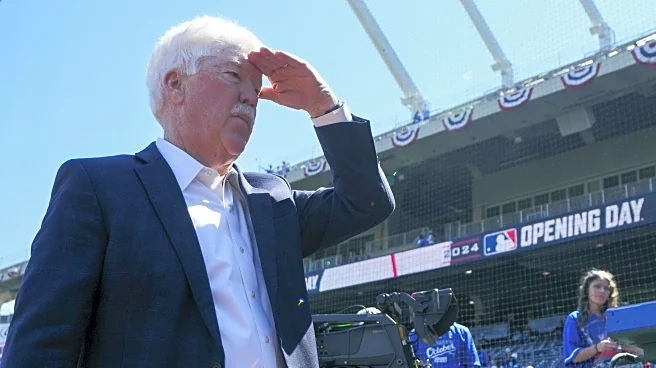John Sherman may not have joined his general manager and field manager for their recent postseason press conference, but that doesn’t mean he doesn’t have anything to say. Instead, he gave an individual
interview to MLB.com’s Royals beat writer, Anne Rogers. And what would Royals Review be if I didn’t find some things to say about it?
He approves of the work done by team leadership
Anne, naturally, asked John about how he felt about the performance of the team’s most public-facing leaders, general manager J.J. Picollo and manager Matt Quatraro. His answer about Picollo could be held up as the encyclopedia definition for saying nothing while appearing to say a lot. It’s the sort of thing that has always made me question the usefulness of these sorts of interviews and press conferences, which are often treated by their subjects as publicity opportunities more than potential avenues for expanding fan knowledge or understanding.
First, the words from the man’s own mouth:
“I feel good about J.J.’s body of work,” Sherman said. “He’s kind of a hustler as a general manager. He is working hard. He’s hard on himself … but he approaches this the right way. He cares deeply about the players, but he cares more about the team and the organization, and that’s the way he conducts himself.”
So, basically, J.J. works hard and he cares about the people he works with and the organization he works for. That describes the vast majority of people in the world. It doesn’t actually tell us anything about how well he does his job. Sure, it has the general tone of praise. But so did the things Picollo said about the hitting coaches and Jonathan India, and none of that prevented him from letting most of the former go or has dimmed the rumors that the latter won’t be in Kansas City next season.
Sherman had something a bit more concrete to say about Quatraro, however (emphasis mine):
“I think [Quatraro] is one of the smartest managers in baseball,” Sherman said. “He processes a lot of information – J.J. talks about, he says, ‘I can’t even keep up with him, he’s so far ahead planning in the game.’ […]”
Sure, that’s not exactly earth-shattering information, but at least it’s something concrete about the quality of work Quatraro does instead of just the amount of work. It builds my confidence in Q as a manager who will continually adapt his strategies as more information comes in. As fans, it’s easy to wish things would happen faster than they do, but things have changed remarkably quickly under Picollo and Quatraro’s leadership compared to most franchises and especially compared to how things were done in KC before they took over. Processing lots of information is where that starts.
He claims wins are more important than profits
Later in the interview, Rogers asked Sherman about the payroll. Sherman, naturally, gave similarly vague answers to the ones Picollo provided a few days earlier. The last bit Rogers included on the subject intrigues me, though:
“We have to win, right? […] It’d be great if you can have an $80 million payroll and pull it off. […] we had to make that investment after ’23 to give us a shot in the arm. If we can be competitive at a lesser dollar rate, that’s great. But we have found ourselves in a situation where we have to invest at a higher level, and it’s important to do so.”
Those of you who read me regularly know that I despise excuses that teams make for not spending more. I’ve argued since before I ever joined Royals Review that baseball would be healthier if MLB owners treated it as a hobby that they invest money into for the sake of enjoyment instead of as a business from which they need to draw profits.
Given that MLB owners – outside the Mets’ Steven Cohen – seem disinclined to acquiesce to my request, having an owner who is willing to accept lesser profits in the name of seeking wins feels like an absolute breath of fresh air. This statement stands in stark contrast to what you’d hear from most owners and front office executives. Sherman is outright saying that it is important to win. Twice. Seriously, when was the last time you heard someone in a position of power in baseball say that flat out without a multitude of self-serving caveats?
Given that attitude, and the fact that his actions have backed up his words for two years running, I find it hard to fault him for hoping to someday compete at a lesser cost. The only qualification I will offer is that he cites the Brewers as a team that has been able to win reasonably consistently in recent history with a lower payroll – Rogers indicates they spend something around $15-20 million less than the Royals this year while winning their division. Sure, the Brewers are a very good, very cost-effective team. But they’re also a team, much like the Rays, without a lot of player loyalty. Corbin Burnes was traded two offseasons ago because he was becoming too expensive. Willy Adames was allowed to leave in free agency last offseason for the same reason.
That isn’t to say the Brewers never spend – Christian Yelich and Jackson Chourio aren’t getting paid peanuts – but Bobby Witt Jr. is going to far outstrip both of those players combined if he plays his entire contract or – more likely – renegotiates before his opt out becomes available. Does that leave room for other fan favorites such as Cole Ragans, Vinnie Pasquantino, and Maikel Garcia? Heck, does it leave room for future fan favorites, Jac Caglianone, Carter Jensen, or David Shields?
The silence about the new stadium is deafening
There wasn’t a single mention – oblique or direct – to the Royals’ stadium situation in Anne Rogers’ published interview. Given her experience and proven ability as a journalist, I doubt that she failed to ask such a question. The lack of a printed response would seem to indicate he either refused to give one or gave such a non-answer that she or her editor felt no need to bother wasting digital ink on adding it to the story. Either way, the Royals continue to get further and further from their self-imposed July deadline for having new information about such a project without providing any information. This, after failing to meet any sort of reasonable deadline for information to the public prior to a vote in 2024 to earmark tax dollars for such an endeavor, does not instill any kind of hope in me for the process being in a good place.










